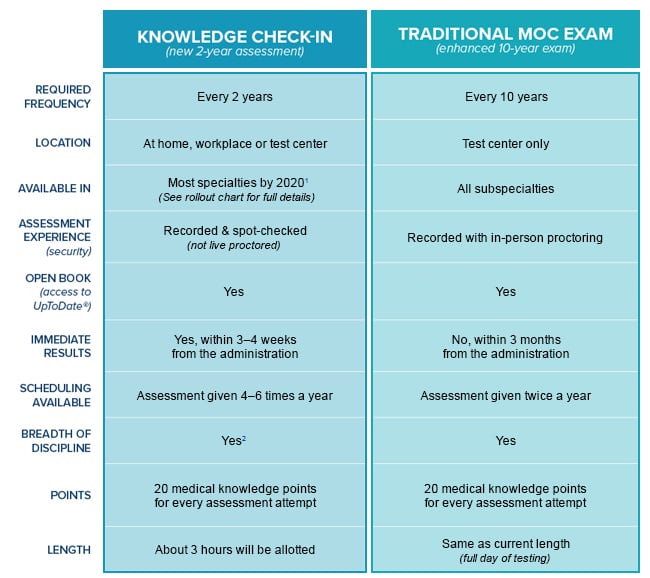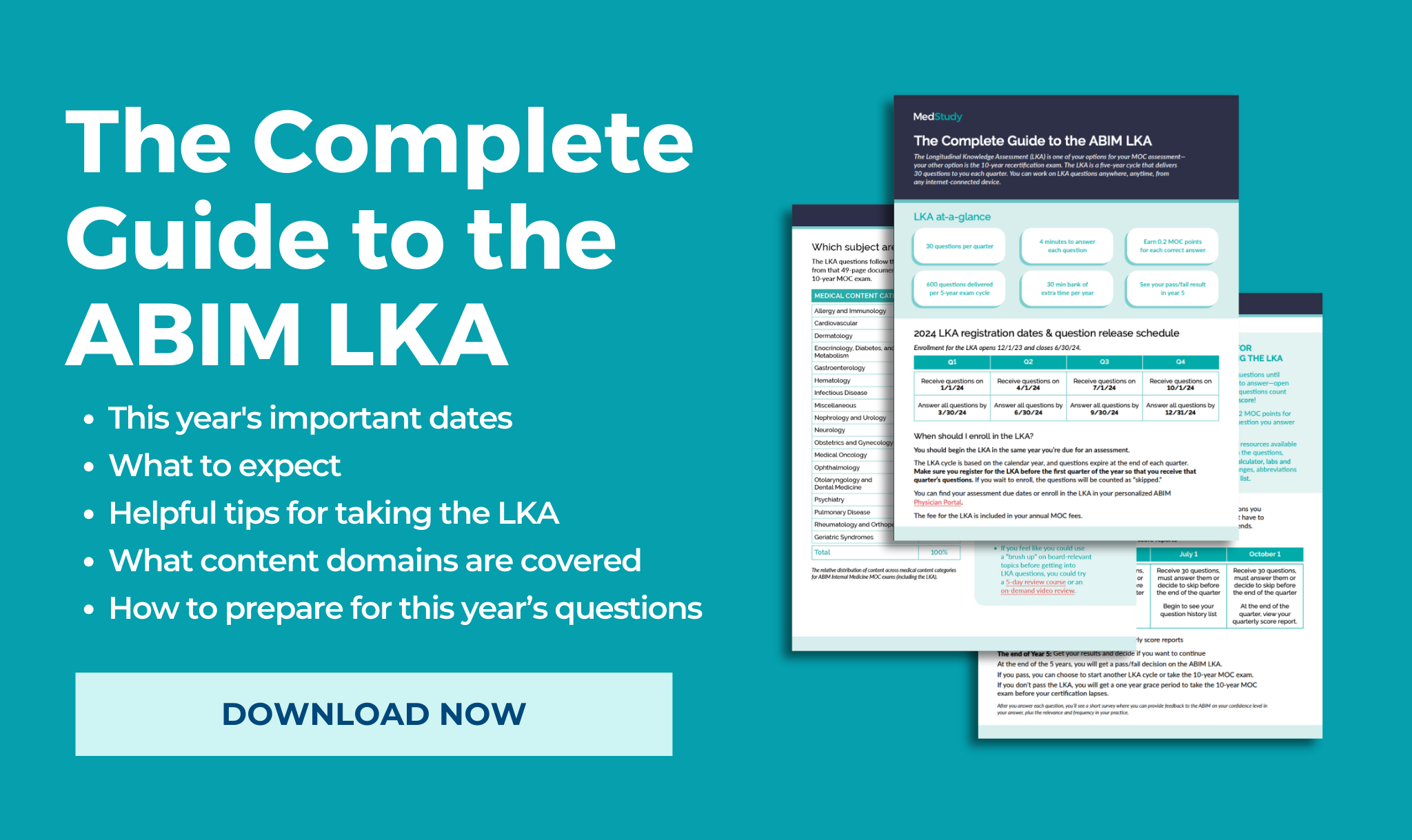The Difference Between the ABIM Knowledge Check-In and the 10-Year Exam

If you’re wondering “Should I take the ABIM knowledge check-in? Or the 10-year exam? Are those my only options? Which MedStudy products do I need to be prepared?”...you’ve landed in the right spot.
At MedStudy, our number one goal is to make learning medicine easier–and a huge part of that means helping doctors feel confident and prepared for their exams. We get tons of questions from physicians about the ABIM knowledge check-in (KCI), and how they need to prepare, so we thought we’d share the answers to their questions here.
“Do I Have Any Other Options?”
The ABIM announced that in 2022 they will be offering a new, self-paced option called the Longitudinal Assessment. It will be a 5-year cycle with 120 questions per year. It gives you the option to take the test from anywhere, answer questions at your own pace, and use the same resources you use while treating patients. The ABIM created this option after hearing that physicians wanted a more flexible exam that will give immediate feedback.
“The ABIM is offering an ‘open book’ exam?”
You heard that right–the ABIM lets you use UpToDate during the KCI exam, making it “open book.”
If you use UpToDate during your clinical practice, you’re probably already familiar with how it works, and you can skip to the next paragraph. If you don’t use UpToDate, all you need to know about it for the KCI is functionality: UpToDate is a point-of-care medical resource docs use to seek answers to specific clinical questions. It’s a great resource for the exam, and it’s the only intra-exam resource the ABIM has approved.
UpToDate is a great clinical resource and is helpful during the KCI exam. But, due to the breadth of discipline, it isn’t a great resource to prepare for the KCI. This is because you really need to know exactly what you’re looking for in UpToDate’s search database–it’s really not meant to be a study resource.
“What's The Difference Between the Knowledge Check-In and The 10-Year Exam?”
“There’s a big difference, actually. The main exam [10 year] was a 2-day exam. And it was just HUGE. You have to take off work, you have to study–I studied for 3 months! And it was way more expensive. The knowledge check-in is cheaper, it’s a 5-hour exam, and it has fewer questions.”
–Dr. Nkem Uzo, Associate Medical Director at Tampa Med Center
The bottom line is, the ABIM doesn’t announce learning objectives for the knowledge check-in. And since you can’t know what they’ll throw at you during the exam, you really need to be knowledgeable on all parts of the ABIM exam blueprint, which covers 10 years of material.
The exam you choose to take depends on what level of studying you’re willing to commit to: you can study hard once every 10 years, or stay current on your knowledge in regards to the exam content and take it every 2 years.

“How Should I Prepare for the Knowledge Check-In?”
Because many practices have UpToDate subscriptions, doctors who took the KCI exam felt like it was more relevant to their clinical practice than the 10-year exam–but there’s still a lot of progress to be made in regards to making exams be applicable to practice.
“[The ABIM] try to tailor it a little more towards our every day [practice], but they’re still, I think, perfecting that… it’s not really quite reflective yet.”
–Dr. Nkem Uzo, Associate Medical Director at Tampa Med Center
“How Are MOC Points Relevant to the ABIM KCI?”
You still need to get 100 MOC points every five years, before the exam. The exam is worth 20 MOC points, so you’ll need to participate in at least one activity every two years to earn 80 MOC points during those two years between exams.
“Which MedStudy Products Should I Use to Prepare for the KCI?”
If you’re planning on taking the KCI exam, the material you need to know won’t be different from someone taking the 10-year exam–both exams are based on the ABIM blueprint, which is the same for the KCI and the 10-year exam.
Generally, the physicians we’ve talked to who’ve elected to take the KCI do so to avoid the stress of having a huge exam that requires a decade’s worth of knowledge; they feel less stress in keeping up with their clinical knowledge on an ongoing basis. They’re still using MedStudy products to prepare for the exam, like flashcards, review courses and our Core textbook.
Since MedStudy products cover everything on the ABIM blueprint, they’ll be helpful on updating you on all content that could be a question on the exam, making you feel prepared, and boosting your confidence heading into the exam. But you won’t be able to take them in with you during exam time.
What we’re hearing from physicians who’ve taken the KCI is that they’re using MedStudy products to prepare for the exam and earn MOC/CME, and they’re going into the exam confident as ever. Then, during the exam, they’re using UpToDate as a reference for specific questions.
“[For my knowledge check-in], I used the Core, the Audio Pearls, and the Flashcards. I didn’t study for very long, I only studied for about 2 weeks. But I felt very confident and prepared going into the exam.”- Dr. Nkem Uzo, Associate Medical Director at Tampa Med Center
Whether you’re preparing to take the KCI, sticking with the 10-year exam, or hoping to take the longitudinal assessment after 2022, we’re here to help you study strong.



